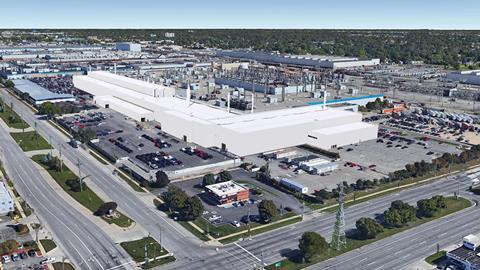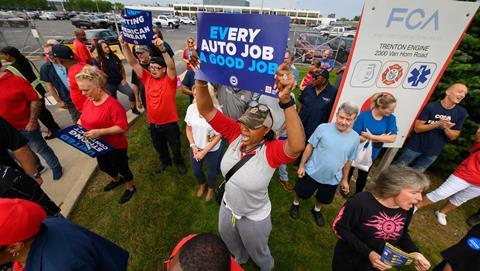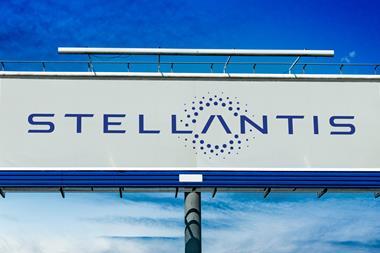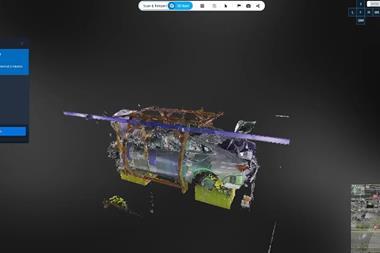Stellantis will end of production of Ram 1500 classic at Warren Truck Assembly Plant, refocussing operations on Wagoneer SUV production

Overview:
- The company says that the plant will move from a two-shift to a one-shift operating pattern in general assembly. Other operations within the plant will remain on two shifts to support Jeep Wagoneer production.
- The OEM recently reported a 21% year-over-year decline in US sales for Q2, and that the company is looking at reducing costs as it faces a growing inventory of unsold vehicles.
- The Ram 1500 Classic is being replaced by the new Ram 1500 Tradesman, but Reuters has reported that the Tradesman variant will be built at the OEM’s Sterling Heights Assembly Plant in Michigan.
Stellantis, the automotive giant encompassing brands like Chrysler, Dodge, and Ram, has announced a significant restructuring effort at its Warren Truck Assembly Plant (WTAP) near Detroit, Michigan. The move includes the redundancy of approximately 2,450 workers and a strategic shift in production focus. This is not the first time that the giant automaker has expressed concerns about the tension between petering demand, profits, and its plans to pivot production ecosystems, underlining some of the difficulties OEMs are currently facing.
Farewell Ram classic, hello electric future
The production line for the Ram 1500 Classic pickup truck will cease operations at WTAP. This decision reflects Stellantis’s broader strategy to prioritise the recently refreshed 2025 Ram 1500 model, which will be produced at the nearby Sterling Heights Assembly Plant. Notably, Stellantis is looking beyond reacting to market trends; it actively seeks to meet evolving consumer preferences with a focus on new technologies and incentives.

The company plans to maintain production levels for successful models like the Jeep Wagoneer and Grand Wagoneer, which have enjoyed strong sales figures. The carmaker is also gearing up for the release of all-electric versions of its pickup trucks, reflecting a significant investment of $400 million earmarked for the Warren plant.
The situation at WTAP exemplifies the broader trends currently impacting the automotive industry. Manufacturers are grappling with the dual challenges of transitioning to electric vehicles and adapting to shifting consumer preferences. Many companies find themselves caught between maintaining legacy products and embracing the innovations necessary to succeed in the future.
Implications for the workforce
The EV production tilt and its ensuing redundancies represent a major blow to the WTAP workforce, currently around 3,900 employees, with plans to make 2,450 - (almost 63%) of those redundant. Stellantis has emphasised its commitment to a smooth transition and has initiated a worker adjustment and retraining notification process with relevant authorities and the United Auto Workers (UAW) union. Redundancy notifications could begin as early as October 8th, 2024.
While the final number of worker redundancies may be lower due to early retirement programs and seniority bumping rights, the impact on the community is undeniable.
The WTAP has been a cornerstone of the local economy, providing jobs and stability for countless families. The looming layoffs raise concerns about job security and economic viability in the surrounding area.
The UAW, recognising the challenges faced by affected workers, has taken an active role by providing support systems during this difficult time. Stellantis has also outlined a support package for laid-off union employees, including 52 weeks of supplemental unemployment benefits, 52 weeks of transition assistance, and extended healthcare coverage for two years.
These measures aim to mitigate some of the financial hardship faced by departing workers.
Trenton Engine Complex to shut down due to 20,700 engine pileup

Stellantis is already feeling the headwinds of the slowing US market. The OEM announced Stellantis’ Trenton Engine Complex, the behemoth churning out V-6 Pentastar engines for Ram, Chrysler, and Jeep models, will grind to a halt next week (week beginning 19 August).
Over 600 workers face temporary lay-offs as the carmaker seeks to “balance engine inventories”.
“Our bank of engines is a little bit high right now,” admitted Dave Gerbi, head of the United Auto Workers Local 372, which represents the plant’s blue-collar workforce. Indeed, a stockpile of some 20,700 finished engines has accumulated.
The Trenton shutdown is the latest in a series of temporary production cuts across Stellantis this summer, along with Warren and Toledo, which have been feeling the squeeze as the carmaker grapples with a 16% sales slump in the first half of the year compared with 2023.
The road ahead
Stellantis is at a critical point. Its ability to effectively balance economic realities with forward-thinking strategy will determine not only its own future, but potentially influence the broader direction of the automotive industry in the face of modern-day demands. The industry’s path forward will depend on the successful navigation of similar challenges by manufacturers around the globe.






































No comments yet